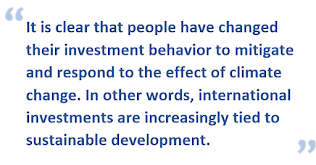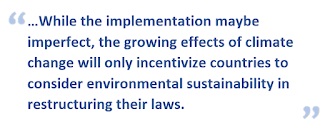Friday Lecture Feature: Climate Change and International Investment Law
Dr. Han Xiuli, a Professor at Xiamen University School of Law, gave a lecture titled “The Expansion of Climate Change Issues in International Investment Law” at the Hopkins-Nanjing Center on December 17th, 2021.
In the beginning of the lecture, Dr. Han explained that as a law professor, she started to pay attention to how climate change will impact international investment law in the long run. It was important for Dr. Han to begin the lecture by bringing up the researchers who have proven the severity of climate change’s effects. In particular, she highlighted two of the 2021 Physics Nobel Prize winners, Shuro Manabe and Klaus Hasselmann, who have proved that the increase in atmospheric temperature is significantly impacted by the carbon dioxide emitted by humans.
In the international investment sector, it is clear that people have changed their investment behavior to mitigate and respond to the effect of climate change. In other words, international investments are increasingly tied to sustainable development. For example, Dr. Han cited that there are fifty-five mentions of climate change in the "2020 World Investment Report."
The presentation was separated into three different parts. The first and second sections discussed how issues of climate change have expanded in international investment law through substantive and procedural laws respectively. Substantive laws include laws governing rights and obligations of certain parties or individuals. For the international investment sector, the easiest place to look at the rights and responsibilities of involving parties is to look at the agreements. According to Dr. Han, recent international investment agreements regularly include the issues of climate change.
Dr. Han emphasized the mention of climate change in the preambles of these agreements. It is important to note that the rights and obligations of international investment agreements are made to fulfill the objectives stated in the preambles. Therefore, parties involved in these agreements are required to make investment measures consistent with the response to climate change. In China’s case, Dr. Han highlighted the China-EU Comprehensive Agreement on Investment (CAI) and the requirement to consider environmental rights and the fight against climate change when making agreements.
Issues of climate change are also regularly brought up in discussing the procedural laws of investment agreements. Procedural laws focus on the due process of law, or how laws should be regulated. Dr. Han explained that the topic of climate change has affected the procedures for settling disputes between parties involved in international investment agreements. For example, participating host countries have the power to incentivize the use of renewable energy. At the same time, efforts to mitigate climate change have negatively impacted the profit gained by investors. An analysis on procedural laws reveals that the international investment sector has started to adapt to climate change. For example, CAI has created a special dispute resolution mechanism to balance the host countries’ efforts to reduce pollution and investors' claims to profit compensation. Specifically, CAI’s climate change clauses provide additional procedures, in which involving parties (host countries and investors) consult with expert groups to reach a resolution.
The last part of Dr. Han’s lecture explained the reasons for the expansion of climate change issues to international investment law. In short, the phenomenon arises from the ideas of systemic integration and mutual supportiveness. Systemic integration is mandated by the Vienna Convention on the Law of Treaties (VCLT). The idea arose from the concern of how fragmented international law, especially international investment law is. In other words, the international investment sector is ruled by treaties that are too specific and not applicable to other laws that involving parties may be subjected to. Including climate change clauses within these treaties results in a more integrated international investment law. In turn, participants of any international investment agreements can pursue climate change mitigation as a common point.
In addition, within the theory of mutual supportiveness, placing environmental clauses within international investment law allows both parties - countries and private companies - to balance economic and non-economic values and reach a more sustainable agreement.
To wrap-up her presentation, Dr. Han reiterated that China and the rest of the world have continued to pay great attention to climate change and how to mitigate its effects. Their commitments are reflected in the expansion of climate change issues to international investment law. This expansion is manifested in different places such as the mentioning of climate change in treaties’ preambles and the inclusion of climate change clauses. As a final point, Dr. Han emphasized that while the implementation may be imperfect, the growing effects of climate change will only continue to incentivize countries to consider environmental sustainability in restructuring their laws.






